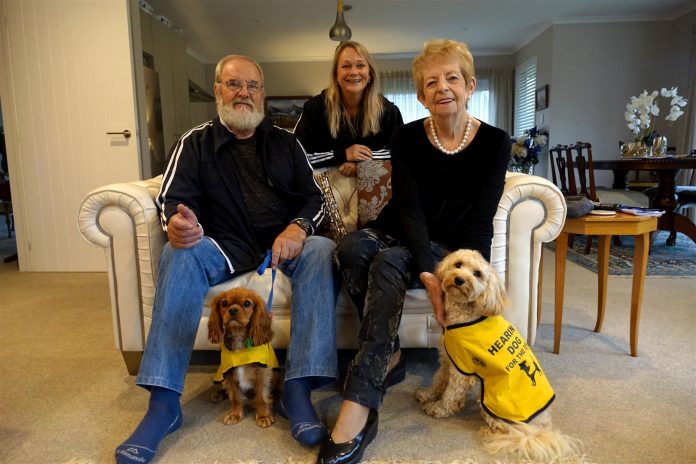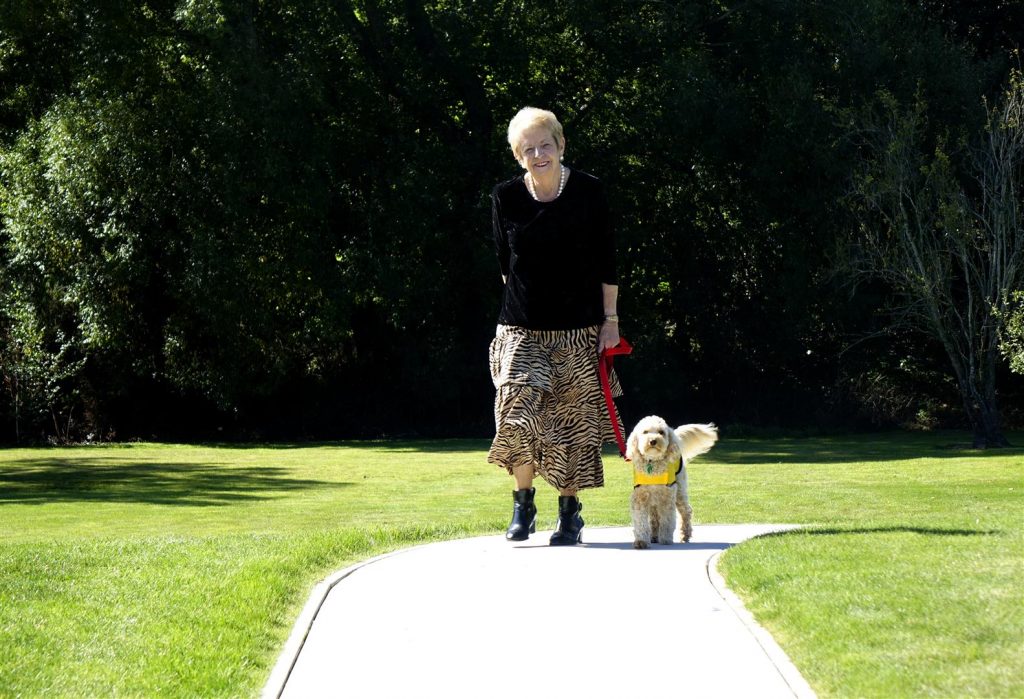
Guide dogs assisting people who are blind or have low vision are a common sight, but there are also guide dogs for those who are hearing-impaired or deaf.
Helen Wallis and Pete White-Driver both have a hearing dog and say it has changed their life.
Pete is on to his second hearing dog called Joy, a King Charles Cavalier, after his first dog he had 11 years ago, ironically went deaf.
‘‘I am profoundly deaf, so socially and around the house she has been marvellous, when my wife goes tramping I’m on my own so she takes over, it’s just better independence,’’ Pete said.
There haven’t been any emergency situations yet, but Pete said when his old fire alarm went off Joy alerted him straight away.
Hearing Dogs New Zealand dog trainer Tracey Cooper explained the smoke alarm is the only sound that they train the dog to go into a down position instead of just alerting on the knees. ‘‘So if a dog alerts you on the knees and goes immediately in the down position that means you need to leave,’’ she said.
Pete said if it wasn’t for Joy he would be sleeping in each day, but she alerts him when his alarm goes off.
Helen, at the time of writing, only had her dog Velo for a few days. Velo is a King Charles Cavalier Mini Poodle Cross, or a ‘Cavoodle’.
Tracey was in town to help Velo and Helen settle in to their new routine.
Helen said it has been really good, and is impressed how well trained Velo is.
‘‘Particularly out walking, she’s right beside you, when you get to the curb she waits, she’s really good.’’
Helen has cochlear hearing aids. ‘‘It is whiteout silence if I haven’t got the cochlear hearing aid, I took both out last night and she was alerting me, that’s a life changer because I have found the last two years really isolating, I’m a people person.’’

Tracey said the national training centre based in New Plymouth is the only hearing dog training centre in the country.
Hearing Dogs New Zealand have been running for 23 years and is a charity.
The dogs are trained to assist people who are hearing impaired by alerting them to sounds in the home like door bells, phones, cooker times, alarm clocks, baby monitors and smoke alarms, which is the big one for most deaf people, Tracey said.
She said deafness is often an invisible disability.
‘‘A hearing dog in their bright yellow jackets creates awareness for the general public when they are out and about that the person is hearing impaired. generally it’s not obvious at all.’’
She said the King Charles Cavalier and Cavoodle are the two breeds they work with the most.
‘‘They are easier to train, they are a good size, they need to be as unobtrusive as possible, going into cafes and things like that, they need to be able to sit by your chair out of the way, smaller breeds work better for public access.’’
People with hearing loss can apply for a hearing dog, which includes supplying support documents from their doctor and audiologist, and references from people who know them.
They are then visited for a formal interview and, if successful the process starts.
Tracy said it can take up to two years to receive a dog.
The puppies are raised in the community by puppy raisers, they start training at eight months old and it takes around six months to train a hearing dog.
The training starts with the dog reacting and running to the trainer when they hear a squeaky toy, then the toy is replaced by other items that make sounds in a household environment.
Pete said the level of training is outstanding, ‘‘I’ve had normal dogs in the past and these go that little bit further, they just about think for you.’’
Tracey said when the dogs have completed their training the recipient is is invited to the training centre in New Plymouth. ‘‘We have nice self contained accommodation, where they stay Monday to Friday and train at the training centre.
‘‘Then a week or two later, I come down and continue the training at home, so we can transfer everything they have both learned in New Plymouth and adapt to suit individual homes, because everyone’s home is different, sounds are different,’’ she said.
Hearing Dogs New Zealand is a charity and Tracey said it costs around $30,000 to train one dog.
‘‘There is no government funding, we train eight a year.’’
For more information or to sponsor a puppy visit: www.hearingdogs.org.nz



